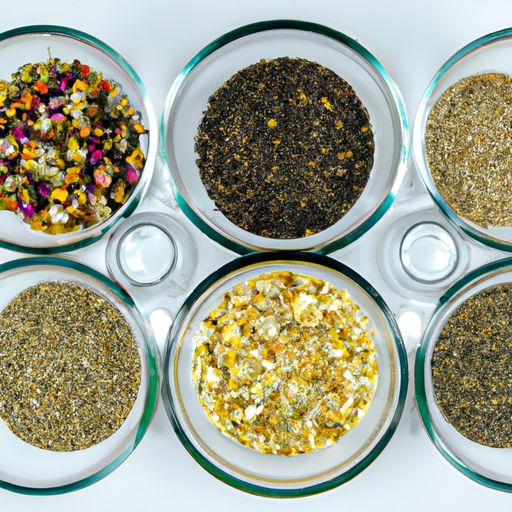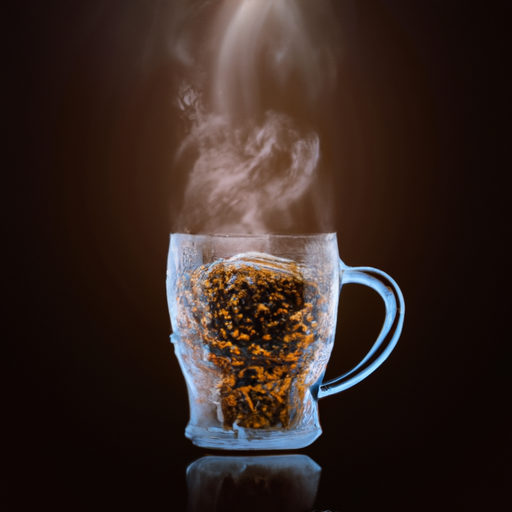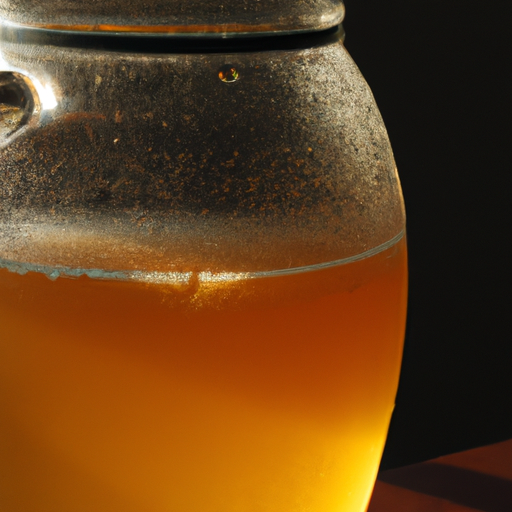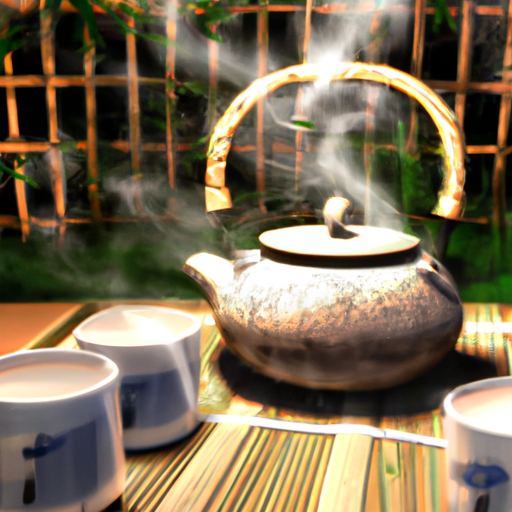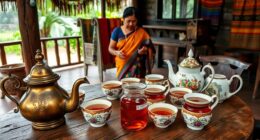In my daily tea drinking habits, barley tea holds a fundamental place. It’s tasty, revitalizing, and comes with a variety of health advantages. But, there are moments when I either exhaust my stock of barley tea or feel the urge to explore different flavors. During these times, I seek alternative teas that can provide a comparable flavor profile and healthful benefits.
In this article, I’ll share some of my favorite alternatives to barley tea that you can try too.
Roasted corn tea or Oksusu Cha is a popular tea in Korea that has a nutty and slightly sweet flavor. It’s made by roasting corn kernels and then steeping them in hot water. Roasted rice tea is another option that has a similar taste to barley tea. It’s made by roasting rice grains until they turn brown and then steeping them in hot water.
These teas not only taste great but also have health benefits like aiding digestion and boosting metabolism. So, if you’re looking for a barley tea alternative, these roasted tea options are a must-try.
Key Takeaways
- Roasted corn tea and roasted rice tea are good alternatives to barley tea with similar taste and health benefits.
- Green tea, rooibos tea, and black tea offer various health benefits like reducing the risk of chronic diseases.
- Buckwheat tea has a nutty, roasted flavor and anti-inflammatory properties while chicory root tea is caffeine-free and great for gut health.
- Adding spices like cinnamon, ginger, or cardamom can enhance the flavor and health benefits of tea.
Roasted Corn Tea (Oksusu Cha)
If you’re out of barley tea, try roasting corn kernels to make Oksusu Cha – it’ll give you a warm, toasty flavor that’s perfect for chilly evenings. Not only is it a delicious alternative, but it also has health benefits.
Corn tea is rich in antioxidants and can help with digestion and weight loss. To make Oksusu Cha, start by roasting dried corn kernels in a pan until they turn golden brown. Then, grind the kernels into a coarse powder and steep it in hot water for about 5 minutes.
The longer you steep it, the stronger the flavor will be. You can also add honey or sugar to sweeten it up. Another great alternative to barley tea is roasted rice tea, also known as Genmaicha.
This tea is made by mixing green tea leaves with roasted brown rice, giving it a nutty flavor. It’s also low in caffeine, making it a great option for those who want to cut back on their caffeine intake.
Roasted Rice Tea
So, let’s talk about roasted rice tea. This tea has a unique flavor and taste profile with a nutty and toasty aroma. It’s a delicious and comforting drink that can be enjoyed hot or cold.
In addition to its flavor, roasted rice tea is also known for its nutritional benefits. It’s rich in antioxidants and aids in digestion.
Flavor and Taste Profile
To substitute barley tea, you may consider trying other tea varieties that offer similar nutty and earthy flavor notes such as buckwheat tea or roasted corn tea. These alternatives are perfect for those who have specific flavor preferences and want to explore new tastes.
Here are some additional barley tea alternatives that you can try:
- Roasted barley tea: If you like the roasted and nutty flavor of barley tea, you can try roasted barley tea, which is made from roasted barley kernels.
- Roasted soybean tea: Also known as ‘hojicha’, this roasted tea has a nutty and earthy flavor that is similar to barley tea.
- Roasted wheat tea: Made from roasted wheat kernels, this tea has a nutty and slightly sweet flavor that can be a great substitute for barley tea.
- Roasted brown rice tea: This tea is made from roasted brown rice and has a nutty and toasty flavor that is similar to barley tea.
When it comes to choosing a barley tea alternative, it’s important to consider your personal preferences and taste buds.
Now, let’s move on to the next section where we’ll discuss the nutritional benefits of these tea varieties.
Nutritional Benefits
Now you can learn about the nutritional benefits of these tea varieties and how they can contribute to your overall health.
There are many alternatives to barley tea that offer a range of nutritional benefits. For example, green tea is packed with antioxidants and has been linked to various health benefits, such as reducing the risk of heart disease and certain cancers.
Rooibos tea, on the other hand, is caffeine-free and rich in vitamins and minerals such as iron, calcium, and zinc. It also has anti-inflammatory properties that can help alleviate symptoms of allergies and skin conditions.
If you’re looking for something with a more robust flavor, black tea can be a good substitute for barley tea. It contains caffeine and is rich in antioxidants that can help improve mental alertness and reduce the risk of chronic diseases.
You can also experiment with different recipes and variations, such as adding spices like cinnamon, ginger, or cardamom to your tea for added flavor and health benefits. With so many options available, it’s easy to find a tea variety that suits your taste and nutritional needs.
Moving on to the next section, roasted barley powder is another great alternative to barley tea that can be used in a variety of ways.
Roasted Barley Powder
If you’re looking for a satisfying alternative to barley tea, you might want to consider using roasted barley powder in your drinks. Roasted barley powder is made by grinding roasted barley into a fine powder, which can then be added to hot water or milk to make a delicious and healthy drink.
Here are some reasons why you should try roasted barley powder:
- Health benefits: Roasted barley is packed with nutrients, including fiber, protein, and vitamins. It also contains antioxidants that can help reduce inflammation and lower the risk of chronic diseases like heart disease and diabetes.
- Brewing tips: To make roasted barley powder, simply add a spoonful of the powder to a cup of hot water or milk and stir well. You can also add honey or other sweeteners to taste. For a stronger flavor, you can use more powder or steep it for a longer period of time.
- Versatility: Roasted barley powder can be used in a variety of drinks, including coffee, tea, and smoothies. It adds a nutty, roasted flavor that pairs well with other ingredients.
- Convenience: Roasted barley powder is easy to store and can be kept in your pantry for months. It’s also less messy than brewing tea or coffee, making it a great option for busy mornings.
If you’re interested in trying other tea alternatives, you might want to consider buckwheat tea. Buckwheat tea is made from the roasted seeds of the buckwheat plant and has a nutty, roasted flavor similar to roasted barley. It’s also packed with nutrients and has been shown to have anti-inflammatory and anti-cancer properties.
Buckwheat Tea
You’ll love the nutty, roasted flavor of buckwheat tea, which is made from the roasted seeds of the buckwheat plant. This tea is a great alternative to barley tea if you’re looking for something with a similar taste.
Buckwheat tea is also packed with nutrients and health benefits that make it a great addition to your daily routine. When brewing buckwheat tea, it’s important to keep in mind that the water temperature should be around 180°F to 190°F for optimal flavor. You can use a tea infuser or simply add the loose tea leaves to hot water and strain them out after a few minutes. If you prefer your tea stronger, you can adjust the amount of tea leaves you use.
Buckwheat tea is known for its numerous health benefits, including its ability to lower blood pressure, improve digestion, and boost the immune system. It’s also rich in antioxidants and has anti-inflammatory properties. So, if you’re looking for a tasty and healthy beverage, buckwheat tea is definitely worth trying.
Speaking of healthy drinks, let’s move on to the next topic, chicory root tea.
Chicory Root Tea
You simply must try chicory root tea – it’s like a warm hug for your taste buds and a superhero for your gut health! If you’re looking for an alternative to barley tea, chicory root tea is a great option.
It’s made from the roasted root of the chicory plant, which has a slightly nutty, earthy flavor. It’s also caffeine-free, so you can enjoy it any time of day without worrying about staying up all night.
To make chicory root tea, you can use the same method as you would for barley tea. Simply add a tablespoon of roasted chicory root to a teapot or infuser, then pour hot water over it and let it steep for 5-10 minutes. You can adjust the strength of the tea by adding more or less chicory root, or by steeping it for a shorter or longer amount of time.
If you’re looking for other chicory root alternatives, you can try adding it to your coffee or using it as a substitute for other roasted grains. It’s also a common ingredient in some herbal teas, so you may already have some in your pantry.
So why not give chicory root tea a try? Your taste buds and your gut will thank you for it. Speaking of herbal teas, have you ever tried dandelion root tea? It’s another great option for those looking for a caffeine-free alternative to barley tea.
Dandelion Root Tea
Get ready to discover the delicious and caffeine-free taste of dandelion root tea! This herbal tea is derived from the roots of the dandelion plant, which has been used for centuries for its various health benefits. Not only is it a great alternative to barley tea, but it can also be enjoyed anytime of the day.
Here are some reasons to give dandelion root tea a try:
- It’s known to aid in digestion and help detoxify the liver.
- Dandelion root tea is also rich in antioxidants, which can help prevent cellular damage in the body.
- It has a slightly sweet and nutty flavor that can be enhanced with a touch of honey or lemon.
- Lastly, dandelion root tea can be a great caffeine-free alternative to coffee or black tea, as it doesn’t contain any caffeine.
To brew a perfect cup of dandelion root tea, start by boiling water and adding a teaspoon of dried dandelion root to a tea infuser or tea bag. Let it steep for 5-10 minutes, depending on your desired strength. You can also add other herbs or spices to the tea, such as ginger or cinnamon, to give it an extra boost of flavor.
Now that you know the benefits and brewing tips of dandelion root tea, it’s time to explore another delicious tea option – ginger tea.
Ginger Tea
I absolutely love ginger tea! The spicy and slightly sweet flavor profile is so comforting and invigorating at the same time.
Not only does ginger tea taste delicious, but it also has numerous nutritional benefits such as aiding in digestion, reducing inflammation, and boosting the immune system.
Flavor and Taste Profile
No other tea can match the nutty and toasty flavor profile of barley tea, making it a unique beverage that’s hard to replace. However, there are other teas that can offer similar health benefits and pairing suggestions. One such tea is ginger tea, which has a spicy and slightly sweet taste that can complement a variety of dishes.
Here is a comparison table of the flavor and taste profile of barley tea and ginger tea:
| Tea | Flavor Profile | Taste Profile |
|---|---|---|
| Barley Tea | Nutty and toasty | Mild and slightly sweet |
| Ginger Tea | Spicy and slightly sweet | Bold and zesty |
While ginger tea may not have the same nutty and toasty flavor as barley tea, it can still be a great alternative for those looking for a flavorful and healthy beverage. Ginger tea is known for its anti-inflammatory properties and can aid in digestion, making it a great pairing for spicy or heavy meals. Additionally, the bold and zesty taste of ginger tea can provide a refreshing and energizing boost to your day.
Moving on to the next section about nutritional benefits, it’s important to note that while barley tea and ginger tea may have different flavor profiles, they both offer unique health benefits that make them great additions to any diet.
Nutritional Benefits
Discover the amazing nutritional benefits that barley tea substitutes have to offer. While barley tea is known for its high fiber content, other alternative teas such as roasted corn tea, roasted brown rice tea, and roasted buckwheat tea are also great sources of fiber. These teas also contain antioxidants that help protect the body’s cells from damage caused by free radicals, which can lead to chronic diseases such as cancer and heart disease.
Additionally, roasted brown rice tea is rich in vitamin B, which helps support the body’s metabolism and energy levels. Health benefits of alternative teas go beyond just fiber and antioxidants. For instance, roasted corn tea is known to contain vitamin C, which boosts the immune system and helps fight off infections. Roasted buckwheat tea, on the other hand, is rich in rutin, a flavonoid that helps improve circulation and reduces the risk of blood clots.
By incorporating these alternative teas in your diet, you not only get to enjoy a variety of flavors but also reap the nutritional benefits they have to offer. Speaking of flavors, let’s move on to the next section about lemon balm tea.
Lemon Balm Tea
I recently discovered the delicious and refreshing Lemon Balm Tea, which has a unique flavor and taste profile. The tea has a subtle citrusy taste with a hint of sweetness, making it a perfect drink to enjoy on a hot summer day.
Not only is it tasty, but Lemon Balm Tea also offers a variety of nutritional benefits. It can reduce stress and anxiety, improve digestion, and boost the immune system.
Flavor and Taste Profile
You can try using roasted corn tea as an alternative to barley tea for a similar nutty and toasty flavor profile. It’s one of the popular substitutes for barley tea.
Roasted corn tea, also known as Oksusu cha, is a traditional Korean tea made from roasted corn kernels. The tea has a slightly sweet and nutty flavor with a hint of smokiness. It’s a great option for those who want a warm and comforting drink without caffeine.
Roasted corn tea is a perfect substitute for barley tea, especially for those who are allergic to gluten. It’s a rich source of antioxidants, vitamins, and minerals. The tea contains high levels of vitamin C, which helps boost the immune system and fight off infections. Additionally, it’s rich in potassium, which helps regulate blood pressure and maintain heart health.
In the following section, we’ll explore the nutritional benefits of roasted corn tea in more detail.
Nutritional Benefits
If you’re looking for a healthy and flavorful drink, roasted corn tea might just be the cherry on top of your sundae. This tea has been used for centuries in Korean and Chinese cultures for its nutritional benefits.
Roasted corn tea is rich in antioxidants, vitamins, and minerals such as vitamin B1, iron, and calcium. These nutrients help boost the immune system, aid in digestion, and maintain healthy bones. Barley tea alternatives like roasted corn tea are also known to have anti-inflammatory properties, making it a great option for those with joint pain or arthritis.
Additionally, the tea is caffeine-free and low in calories, making it a guilt-free option for those looking to cut back on their caffeine intake or maintain a healthy lifestyle. With its nutty and slightly sweet flavor, roasted corn tea is a delicious and nutritious option for those looking for an alternative to barley tea.
Frequently Asked Questions
What are the health benefits of drinking roasted corn tea?
Drinking roasted corn tea offers numerous health benefits that make it a great alternative to traditional teas. One of the most notable benefits is its ability to improve digestion and relieve gastrointestinal discomfort.
It also contains antioxidants that help to reduce inflammation in the body and promote healthy skin. To prepare roasted corn tea, simply roast fresh corn kernels in a skillet until they turn brown and then steep them in hot water for several minutes.
The resulting tea is flavorful and aromatic, with a slightly sweet taste that is perfect for drinking on its own or with a bit of honey. Overall, roasted corn tea is a delicious and nutritious beverage that offers a wide range of health benefits and can be enjoyed in a variety of different ways.
Can roasted rice tea be made with any type of rice?
As the old saying goes, "variety is the spice of life."That’s why exploring different tea alternatives can be a great way to switch up your routine.
When it comes to roasted rice tea, it’s important to note that not all types of rice are suitable for making this delicious beverage. Short-grain white rice is the most commonly used type, but you can also experiment with other varieties like brown or black rice.
To make roasted rice tea at home, you’ll need to first toast the rice in a dry pan until it turns golden brown and emits a nutty aroma. Then, simply steep the rice in hot water and strain out the grains before enjoying.
If you’re looking for roasted rice tea alternatives, you might consider trying other grain-based teas like corn or barley, or even branching out into herbal blends for a unique twist.
No matter which option you choose, taking the time to explore different tea varieties can be a fun and rewarding journey.
How is roasted barley powder different from roasted barley tea?
Roasted barley powder and roasted barley tea are two distinct products with notable differences. Roasted barley powder is finely ground roasted barley grains, while roasted barley tea is brewed from whole roasted barley kernels.
The powder is often used as an ingredient in recipes, while the tea is enjoyed as a beverage. In terms of substitutes or alternatives, one could use other types of roasted grain teas such as roasted corn or roasted rice tea. However, if seeking a non-grain-based option, herbal teas like chamomile or mint can offer a similar comforting and flavorful experience.
Is buckwheat tea safe for people with gluten sensitivities?
When it comes to gluten-free options for tea, buckwheat tea is a great choice.
As someone with gluten sensitivities, I was hesitant to try it at first, but I was pleasantly surprised by its taste.
It has a nutty and slightly earthy flavor, similar to roasted barley tea but with a slightly sweeter aftertaste.
In terms of taste comparison, I would say that buckwheat tea is a great substitute for barley tea.
Plus, it’s a great source of antioxidants and has been linked to improved digestion and heart health.
So, for those looking for a gluten-free alternative to barley tea, I highly recommend giving buckwheat tea a try.
Does chicory root tea have any potential side effects?
I’ve looked into the potential risks of chicory root tea and while it can have some beneficial effects on digestion, it’s important to be aware of any potential side effects. Some people may experience digestive issues, such as bloating or gas, after consuming chicory root tea.
As for chicory root alternatives, there are a variety of herbal teas that can be used in place of barley tea, such as dandelion root tea or roasted carob tea. These alternatives provide a similar nutty and earthy flavor without the potential risks associated with chicory root.
It’s always important to listen to your body and be aware of any adverse reactions when trying new teas or herbal remedies.
Conclusion
In conclusion, I’ve discovered a plethora of options that offer unique flavors and health benefits as substitutes for barley tea. These alternatives aren’t just replacements, but a symbol of the diversity and richness of the world we live in.
Each tea has its own story and character. I’m reminded of the different cultures and traditions that have given birth to these beverages as I sip on them. With each sip, I’m transported to a different place, a different time, and a different experience.
So let’s celebrate the variety and beauty of the world, and explore the endless possibilities that lie before us.

